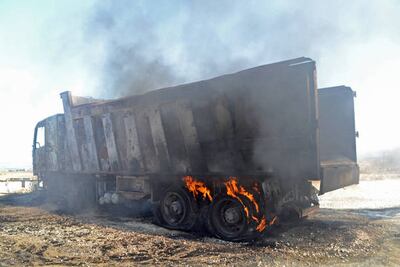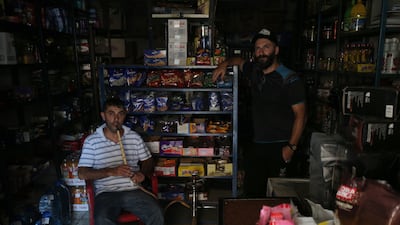For half a century, Lebanon has not had a reliable supply of power. Privately owned, diesel-powered generators are a staple of the country’s electricity infrastructure. Even this bootstrapped solution, however, has never quite managed to fill the shortfall caused by inadequate state facilities. Until the country’s financial crisis began in 2019, daily power cuts, normally lasting a few hours, were the norm.
In today’s Lebanon, such a sorry state of affairs would be considered a luxury. The financial crisis, prolonged by the inability of the country’s politicians to form a working administration, has become so acute that the state’s ability to keep the lights on has all but collapsed.
Last week, the electricity minister said the government, which relies on fuel for electricity production, can barely manage to produce 25 per cent of what is required. The amount is so low that private generators, which are also chronically low on fuel supplies, cannot come close to filling the gap. On any given day, most residents of Beirut are lucky to have two hours of electricity. They are having to learn to live without even the most basic appliances, such as refrigerators, while key institutions like Beirut airport and universities are having to operate with hardly any power.
The situation is especially critical in Lebanon’s hospitals. The country is still caught in the midst of the Covid-19 pandemic, but even without that the effects on health and the healthcare sector would be dire. Eighty per cent of Lebanese now live in poverty, and there is a nationwide shortage of most medicines.
One hospital worker in southern Lebanon told The National that patients are being advised to procure their own medication and bring it with them when they come in for treatment. And although hospitals have priority status when it comes to receiving meagre electricity supplies, many have had to endure power cuts lasting hours, significantly increasing the risk of infections and threatening the lives of patients relying on electrical devices, such as ventilators.
“A hospital without electricity simply does not exist,” Firass Abiad, the head of Rafik Hariri University Hospital, told The National earlier this week. “It’s like a car without petrol.”

But cars with empty fuel tanks are also a common sight now; the streets of Beirut are lined with them. Taxis and minibuses, the primary forms of public transport, are difficult to find, and the absence of working traffic lights have made road transport for those who can manage to drive more dangerous.
To further complicate matters, on Wednesday Riyad Salameh, the country’s central bank governor, who is currently facing a corruption probe in Switzerland, announced that fuel subsidies would be cut dramatically. These subsidies benefit both the poor and rich, but lifting them without a safety net will harm those who are most vulnerable. And to add injury to insult, on Sunday a tank storing precious fuel in Akkar, northern Lebanon, exploded, killing 22 people and wounding 79.
As things stand, the fuel shortage is expected to continue until Lebanon’s political leaders find a way to end their quarrelling and reach a lasting political settlement. The country’s allies in the West and the Arab world have demanded as much before they offer any significant aid, out of justifiable fears that corrupt leaders will loot or squander any donations, as they have in the past.
Last month, Lebanon signed a complex deal with Iraq to receive shipments of heavy fuel, unsuitable for Lebanese power plants, that it could resell to companies who could then turn it into useable fuel for the Lebanese market. It is a suitably imaginative proposal designed to avoid any free handouts, but it may take a long time to implement. The longer the circumstances persist, the question of whether and how to help Lebanon is becoming as much of a humanitarian issue as it is a political or economic one.


